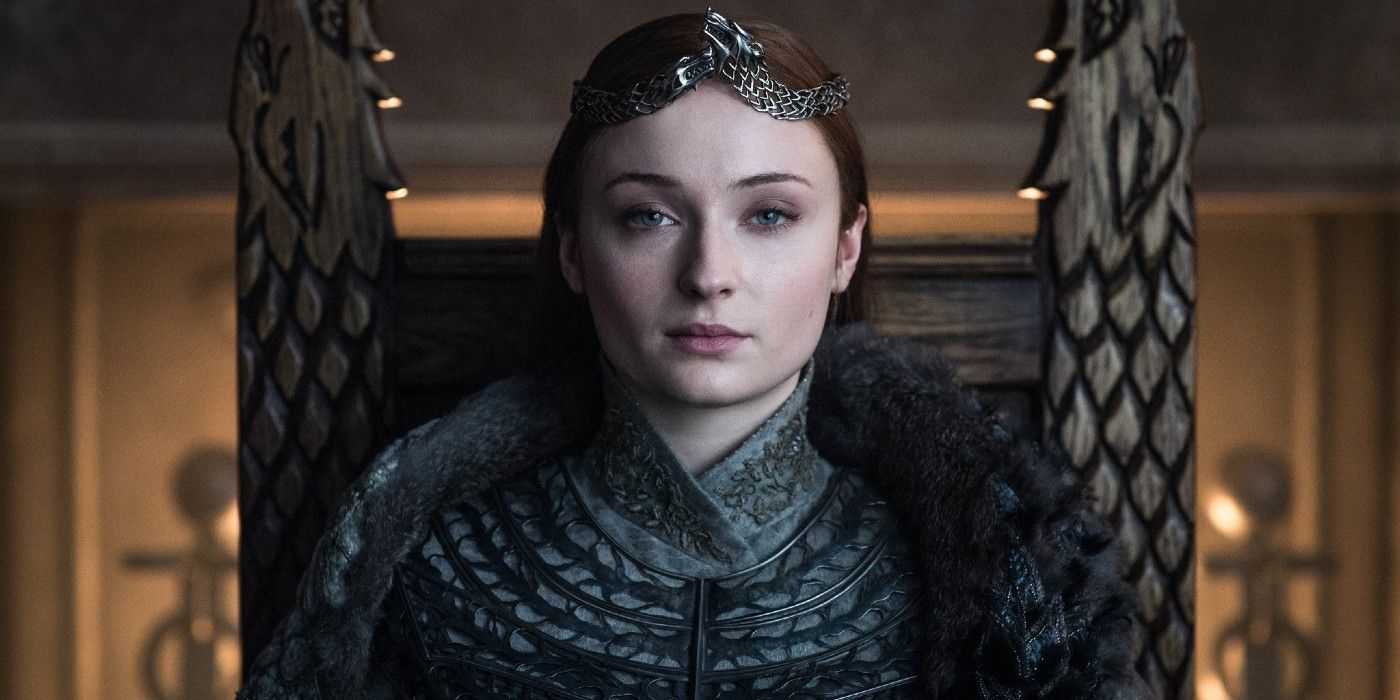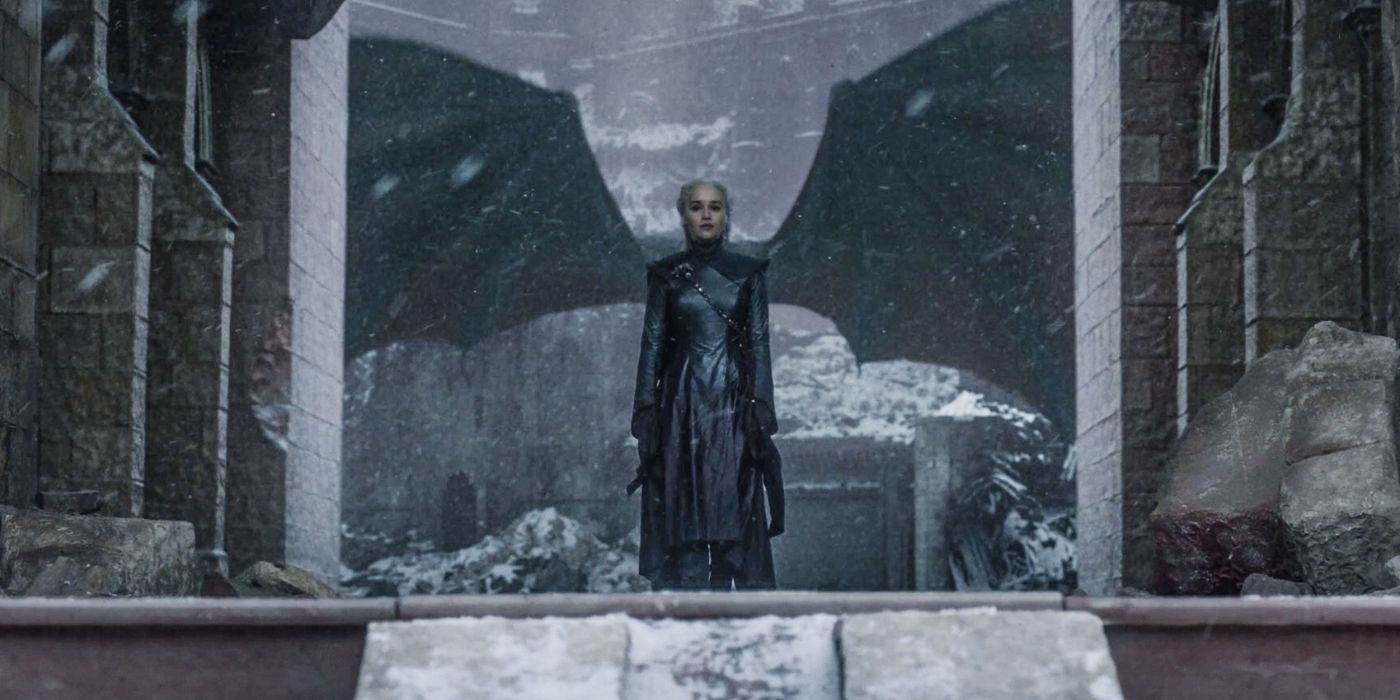The Big Picture
- Daenerys Targaryen's descent into evil makes her the most compelling Game of Thrones villain, with her motivations and character arc well-established.
- Daenerys always had the potential to be both good and bad, and her actions throughout the series justify her descent into madness.
- Game of Thrones lacks compelling motivations for its villains, making the morally gray antiheroes more interesting. Daenerys' character provides depth and complexity.
Several Game of Thrones villains lack compelling motivation or have less fleshed-out character arcs, especially compared to the show's heroes and morally gray antiheroes. Daenerys Targaryen’s (Emilia Clarke) swift descent into evil in the show's final season, motivated by betrayal from her advisors, misogyny, and the death of her dragons and her close friend and advisor Missandei (Nathalie Emmanuel), makes her the most compelling Game of Thrones villain. Yes, that's a controversial statement to call her a villain, but no one can deny the havoc she wreaks on King's Landing or her descent into the Mad Queen.
Even compared to the show’s most love-to-hate antagonists, Daenerys is by far the most intimidating at the height of her rage in the series' final episodes. Every detail, from Daenerys's chilling rallying speech after destroying King’s Landing to the shot of Drogon’s wings behind her, was iconic. In reality, Daenerys's villain arc wasn't rushed or inconsistent with her character. The potential to go bad was written into the Targaryen queen's character from the beginning and was foreshadowed even in the early and mid-seasons of Game of Thrones.

Game Of Thrones
Nine noble families fight for control over the lands of Westeros while an ancient enemy returns after being dormant for millennia.
- Release Date
- April 17, 2011
- Cast
- Peter Dinklage , Lena Headey , Nikolaj Coster-Waldau , Emilia Clarke , Kit Harington , Sophie Turner , Maisie Williams
- Seasons
- 8
- Studio
- HBO
Daenerys Is a True Targaryen in the Best and Worst Ways
Daenerys epitomizes the best and worst of the Targaryen family: a fiery conqueror with a dragon-sized sense of entitlement and desire for power. In Season 8, Varys (Conleth Hill) tells Jon (Kit Harington), "They say every time a Targaryen is born, the gods toss a coin, and the world holds its breath." Jon Snow was never going to be the "mad" Targaryen, but Daenerys always had a touch of unpredictability and a penchant for vengeance starting as early as Season 1, when she doesn't intervene in Khal Drogo (Jason Momoa) gruesomely killing her brother, or later in the season when she asks Jorah Mormont (Iain Glen) to bind Mirri Maz Duur (Mia Soteriou), the godswife from Lhazareen, to Khal Drogo's funeral pyre as Daenerys herself steps into the flames to hatch her dragon eggs in Episode 10 "Fire and Blood." Even if these killings feel justified — Viserys Targaryen (Harry Lloyd) is one of the series' worst siblings, which is quite the accomplishment considering the Lannisters exist, and the godswife cursed Daenerys's unborn child — the formerly enslaved woman Mirri Maz Duur merely sought vengeance of her own after suffering brutality at the hands of Khal Drogo's men, and her chilling screams throughout the scene feel villainous, especially in retrospect.
In the House of the Undying in Season 2, Daenerys walks through a half-demolished Iron Throne room, and shortly after, she burns a warlock alive. The hints were there all along, and they were glaring. Throughout Game of Thrones, Daenerys is quick to betray Astapori slave traders and evil warlocks and her actions are completely justified, even if her methods leave something to be desired. Compare this to the death of Shireen Baratheon (Kerry Ingram), who wronged no one. There's no room for forgiveness when Daenerys has been wronged, and Westeros has wronged her by embracing the usurper Robert Baratheon (Mark Addy) after his war led to the near-extinction of her family line. It isn't a question of whether Daenerys's motivations are sound, but if she's going too far, and the fact that Daenerys is so justified makes her more compelling and believable compared to the series' heroes and villains alike.

Admit It, You Were Wrong About Sansa Stark
In the end, Sansa becomes one of the biggest winners of 'Game of Thrones.'
Daenerys Always Had the Potential To Be Good and Bad
When Daenerys Targaryen is introduced in Season 1, she is a character full of untapped potential. Objectified by the men around her, particularly her brother and Khal Drogo, the future Targaryen queen has no power and very little autonomy, but like her petrified dragon eggs, there is the potential for her to become something much larger. It is always a feat of any media to get an audience cheering for the antagonist, and the denial that Daenerys is a villain and pushback related to the finale means that David Benioff and D.B. Weiss succeeded in building a villain worth rooting for, who, despite her character's history of violence — quite literally embodying the Targaryen motto "Fire and Blood" — was someone we wanted to see on the Iron Throne. The world of Game of Thrones is a bleak one, so maybe there is no one better to rule over Westeros than a "take-no-prisoners" dragon queen with an iron will.
In Season 7, when Daenerys unflinchingly kills Randyll Tarly (James Faulkner) and his son for refusing to bend the knee, the precedent was there all along. Daenerys had always led with dragon fire and rarely accepted apologies or compromise. Where Game of Thrones characters like Robb Stark (Richard Madden) and Jon Snow suffer remorse after killing the people who betrayed them, Daenerys never does. Who could forget when Daenerys locked the handmaiden Doreah (Roxanne McKee) who betrayed her and the rich merchant Xaro Xhoan Daxos (Nonso Anozie) in a vault to die? Daenerys always had the potential to be a "villain," and the realization of her arc in the final seasons delivers, with Daenerys carrying out what her father the "Mad King" Aerys put in motion before her birth.
'Game of Thrones' Has a Villain Problem
Many of the villains in Game of Thrones are flat-out evil with very little on-screen motivation. Ramsay Bolton (Iwan Rheon) and Joffrey Baratheon (Jack Gleeson) are a pure evil even the most sympathetic audience can't justify or seek to understand. Compared to Daenerys, the Game of Thrones just barely scratches the surface of what drives Cersei Lannister (Lena Headey) to be so cruel. This trait of Game of Thrones antagonists is what makes the complex, morally gray antiheroes so interesting. For much of the series, Daenerys was teetering on the morality scale somewhere in the middle. She was killing people in some of the most brutal ways, but they were bad people who deserved it, until her killing turned more indiscriminate. The final seasons inventory the moments that tip Daenerys's coin towards "madness," with betrayal after betrayal and the tragic deaths of the dragons she considered her children and her closest friend. Daenerys's actions after the bells chime out King's Landing's surrender is a wakeup call. The signs were there all along, but like the dragon queen's many adoring followers, we loved her too much to see the warning signs that were there all along.
Game of Thrones is available to stream on Max in the U.S.


